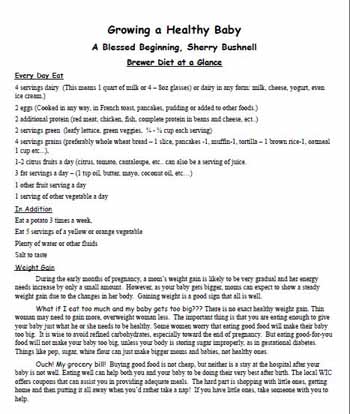Growing a Healthy Baby
A Blessed Beginning, Sherry Bushnell
Brewer Diet at a Glance

Every Day Eat
4 servings dairy (This means 1 quart of milk or 4 – 8oz glasses) or dairy in any form: milk, cheese, yogurt, even ice cream.)
2 eggs (Cooked in any way, in French toast, pancakes, pudding or added to other foods.)
2 additional protein (red meat, chicken, fish, complete protein in beans and cheese, ect..)
2 servings green (leafy lettuce, green veggies, ¼ – ½ cup each serving)
4 servings grains (preferably whole wheat bread – 1 slice, pancakes -1, muffin-1, tortilla – 1 brown rice-1, oatmeal 1 cup etc…),
1-2 citrus fruits a day (citrus, tomato, cantaloupe, etc.. can also be a serving of juice.
3 fat servings a day – (1 tsp oil, butter, mayo, coconut oil, etc…)
1 other fruit serving a day
1 serving of other vegetable a day
In Addition
Eat a potato 3 times a week,
Eat 5 servings of a yellow or orange vegetable
Plenty of water or other fluids
Salt to taste
Weight Gain
During the early months of pregnancy, a mom’s weight gain is likely to be very gradual and her energy needs increase by only a small amount. However, as your baby gets bigger, moms can expect to show a steady weight gain due to the changes in her body. Gaining weight is a good sign that all is well.
What if I eat too much and my baby gets too big??? There is no exact healthy weight gain. Thin woman may need to gain more, overweight woman less. The important thing is that you are eating enough to give your baby just what he or she needs to be healthy. Some women worry that eating good food will make their baby too big. It is wise to avoid refined carbohydrates, especially toward the end of pregnancy. But eating good-for-you food will not make your baby too big, unless your body is storing sugar improperly, as in gestational diabetes. Things like pop, sugar, white flour can just make bigger moms and babies, not healthy ones.
Ouch! My grocery bill! Buying good food is not cheap, but neither is a stay at the hospital after your baby is not well. Eating well can help both you and your baby to be doing their very best after birth. The local WIC offers coupons that can assist you in providing adequate meals. The hard part is shopping with little ones, getting home and then putting it all away when you’d rather take a nap! If you have little ones, take someone with you to help.
Basic Supplement Recommendations
for Growing a Healthy Baby.
Vitamin K – Vitamin K is used in the body to control blood clotting and is essential for synthesizing the liver protein that controls the clotting. Newborns deficient of this vitamin can have inter-cranial hemorrhages. In pregnancy you might be in need of more Vitamin K, but be careful not to take too much Vitamin K in the last stages of pregnancy, could be toxic for baby. Vitamin K is found in leafy vegetables (especially spinach and celery), cheese and liver. It is also found in asparagus, coffee, bacon and green tea. From a practical standpoint chlorophyll (below) is a good, safe dietary source of vitamin K.
Good prenatal vitamin, or good multivitamin and extra B complex – Some of our favorites are Nature Sunshine and Twin Lab’s Prenatal vitamins. A good combination can be a high quality brand of multivitamin, and additional B complex.
Extra vitamin E… until the last 4 weeks. For pregnant women, insufficient dietary vitamin E (found in vegetable oils, nuts, cereals and some leafy green vegetables) may lead to complications like pre-eclampsia and the baby being born small. Studies have found that the human placenta can deliver natural vitamin E to the fetus much better than synthetic vitamin E. (To identify the kind of vitamin E in a supplement, read the ingredients listed on the label. Natural vitamin E begins with “d,” as in “d-alpha-tocopherol. The synthetic version begins with “dl.”).
Too much Vitamin E at near the end of pregnancy may prevent easy delivery of the placenta.
At this time, switch to taking Evening Primrose. Evening Primrose Oil or EPO causes uterine contractions in pregnancy, so it should not be used until the last 4 weeks.
Extra calcium – Important during pregnancy and throughout our woman lives. Lack of adequate calcium during pregnancy is associated with muscle cramps, backache, high blood pressure, intense labor and afterbirth pains, osteoporosis and pre-eclampsia. Take a supplement that is liquid and absorbable. Calcium assimilation is governed by exercise, stress, acidity during digestion, availability of vitamin C, A and especially D, and availability of magnesium and phosphorous in the body and the diet. The best food sources of calcium are fish and dairy products. Take calcium in the evening before bed for a nice relaxing sleep!
Alfalfa or other source of chlorophyll – Chlorophyll is available as liquid, in gel caps, or dried tablets. Liquid is best, but some moms have a hard time with the taste. (Some say drinking it in a cup with a lid helps) Capsules do just as good a job, but may not be absorbed as fast. It also has the added benefit of actually having a slight laxative effect instead of constipation. Liquid chlorophyll is one of the best blood-builders being rich in easily digestible iron, avoiding constipation. It also provides a tonic effect, giving a bit of energy that is needed during pregnancy. Some people like to take it toward the end of pregnancy as a prevention for hemorrhage. Don’t be surprised by its rather weird effect… it causes bright green stools!
Good books to read:
What Every Pregnant Woman Should Know by Gail Brewer with Tom Brewer, MD
The Brewer Medical Diet for Normal and High Risk Pregnancy by same author above.
Naturally Healthy Pregnancy – by Shonda Parker